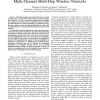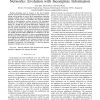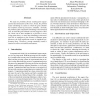108 search results - page 10 / 22 » -Hardness of Pure Nash Equilibrium in Scheduling and Connect... |
ICC
2009
IEEE
13 years 5 months ago
2009
IEEE
Typically, topology control is perceived as a per-node transmit power control process that achieves certain networklevel objectives. We take an alternative approach of controlling ...
CDC
2010
IEEE
13 years 2 months ago
2010
IEEE
Game theory is emerging as a popular tool for distributed control of multiagent systems. In order to take advantage of these game theoretic tools the interactions of the autonomous...
PE
2002
Springer
13 years 7 months ago
2002
Springer
The paper studies routing in loss networks in the framework of a non-cooperative game with selfish users. Two solution concepts are considered: the Nash equilibrium, corresponding...
WCNC
2010
IEEE
13 years 11 months ago
2010
IEEE
—Enabling users to connect to the best available network, dynamic network selection scheme is important for satisfying various quality of service (QoS) requirements, achieving se...
CCGRID
2007
IEEE
14 years 1 months ago
2007
IEEE
We study two problems directly resulting from organizational decentralization of the Grid. Firstly, the problem of fair scheduling in systems in which the grid scheduler has compl...



